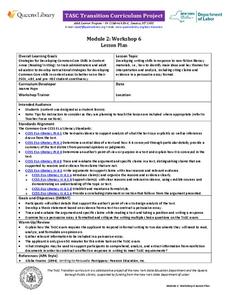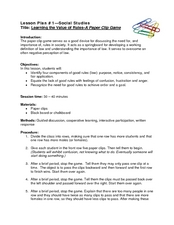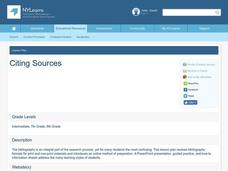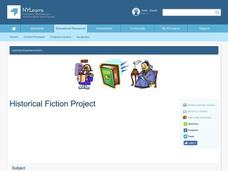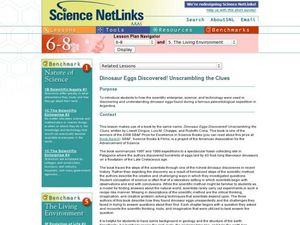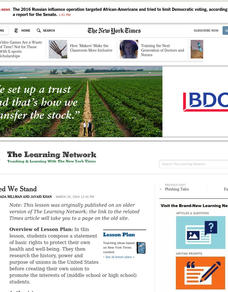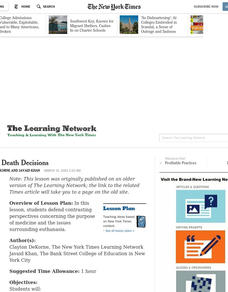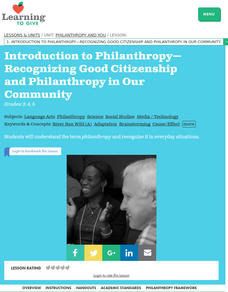Curated OER
The Season of Snow...and Learning
Winter-themed language arts lessons that will keep pupils reading and writing.
Curated OER
Valentine's Day Poems
Roses are red, violets are blue, poems are sweet, and educational too.
EngageNY
TASC Transition Curriculum: Workshop 6
Is a college education necessary for success in today's world? The class investigates the question, along with others at the end of the sixth workshop in a 15-part series. The instructional activity has four parts with multiple...
EngageNY
TASC Transition Curriculum: Workshop 12
How can opinions slant facts? Workshop participants learn how to examine primary and secondary sources and identify the author's point of view. They also examine how visual art impacts the meaning and rhetoric of sources. Full of...
Curated OER
Learning the Value of Rules - A Paper Clip Game
Using a game, learners discuss laws and fairness in society. In order to play the game, they line up in rows in the classroom. The teacher gives them paper clips based on their sex or other criteria. They can begin to discuss issues of...
Curated OER
Citing Sources
Students explore the purpose and requirements for a bibliography. They examine where to find bibliographic information in a variety of print and non-print sources on an assigned topic. Students prepare a bibliography online using a...
Curated OER
Citing Sources
Practice citation skills with this activity, which takes learners to the Library/Media center. There, they will view a Powerpoint presentation and practice collecting data in both print and non-print sources. All necessary materials are...
Curated OER
Animal Research Pamphlet
Fourth graders perform research on an animal of choice. The reading of a novel is done prior to the research in order to establish context for the lesson. The use of the library for research is a key skill for this lesson.
Curated OER
Latitude
Students examine the theory of finding latitude and discuss the uses of an astrolabe, cross-staff and octant. They determine an Astronomical Table for their classroom.
Curated OER
Are You Sure You've Got the Right Answer?
Young researchers work through the research cycle. They question, plan, gather, sort, synthesize, and evaluate the materials they collect at the library. There are web supplements for this lesson.
Curated OER
Historical Fiction Project
Students be engaged in a history project that is combined with Language Arts with the purpose of teaching students how to cite bibliographic information. This is important for doing future research.
Curated OER
Dinosaur Eggs Discovered! Unscrambling the Clues
Just a heads up: this lesson is based on a book, Dinosaur Eggs Discovered! Unscrambling the Clues. If you do not have or do not want to purchase the book, you may still find the other activities and worksheets useful in your earth...
Curated OER
Responsibility in the Classroom
Young scholars study responsible behavior. In this behavior lesson, students discuss ways friends show responsibility. Young scholars take turns selecting a card about responsible behavior and describe the card's behavior. Students make...
Curated OER
Infusing Equity by Gender into the Classroom: A Handbook of Classroom Practices--See What We've Done
Students research a leader or achiever, prepare a poster, and participate in a panel discussion and role play. In this contributions by people of diverse backgrounds lesson, students choose a leader and find three resources about...
Beacon Learning Center
Beacon Lesson Plan Library: Formal or Informal?
Start talking trash with your elementary English class! Then lead a discussion comparing formal and informal language. Divide the class into groups to answer a questionnaire and analyze a set of sentence cards to analyze. This is a cool...
Nemours KidsHealth
Fire Safety: Grades 3-5
Three lessons stress the importance of fire safety. Lesson one presents several articles listing fire safety do's and don'ts; using their newly-found knowledge, learners rewrite a newspaper article about a fire incident so that...
National Library of Medicine
Your Environment, Your Health: Runoff, Impervious Surfaces, and Smart Development
Can a sidewalk increase the amount of pollution in local streams? Scholars learn the answer to this question though research and experimentation in the fifth unit in the six-part series. Pupils study runoff, impervious surfaces, and the...
Curated OER
Teams in the Field
Students conduct team interviews outside the classroom, either within the school or beyond, as part of a fieldwork project. They use reasoning skills as they formulate questions, plan, predict, hypothesize, and speculate about the...
Curated OER
The Three Major Monotheistic Religions
This activity gives students an opportunity to learn about the three major monotheistic religions in a fun and challenging way, while also allowing them to hone their library research skills. Students research one of the three religions....
Curated OER
Unionized We Stand
Students compose a statement of basic rights to protect their own health and well-being. They research the history, power and purpose of unions in the United States before creating their own union to promote the interests of students.
Curated OER
Life and Death Decisions
Students defend contrasting perspectives concerning the purpose of medicine and the issues surrounding euthanasia.
Curated OER
Substance Use, or Abuse?
Students identify the medicinal benefits, and ill effects, of a variety of controlled substances. They determine whether or not they think hallucinogens should be researched for possible medicinal purposes.
Curated OER
Government Gripes
Students, in groups, investigate the purpose and jurisdiction of government agencies assigned to regulate different science/technology/health issues, then describe situations in which agencies might have a disagreement, and stage a mock...
Curated OER
Introduction to Philanthropy-Recognizing Good Citizenship and Philanthropy in Our Community
Students explore the term philanthropy and recognize it in everyday situations. They list three philanthropic activities occurring in their own home, in their classroom, or in their school. Students identify at least one act they might...


